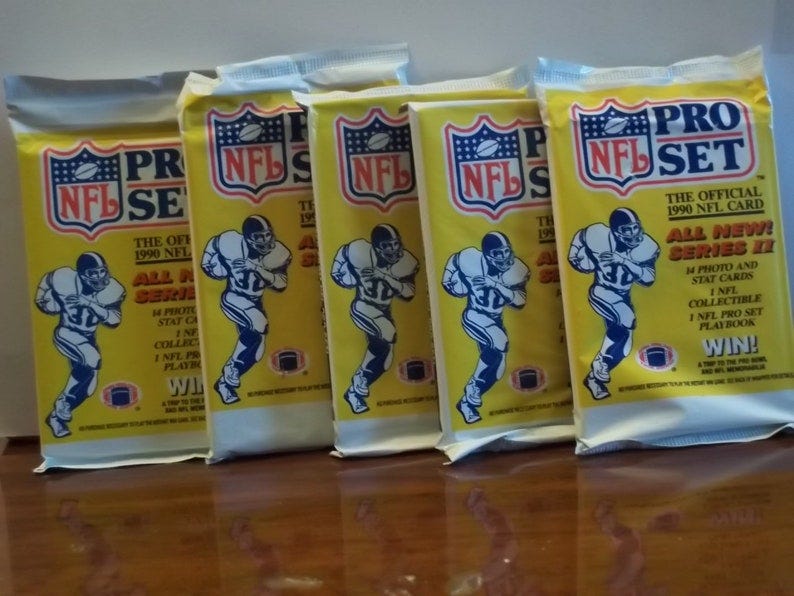Remembering Pro Set
The company founded in 1989 hit the football card scene with a lot of hype, but was out of business in just four years.
Photo credit: Etsy
Football cards have been in existence as far back as 1894, but when the sports card market rose to prominence in the late 1970s and early 1980s, it was baseball cards that led the way.
Perhaps this was because there were three companies producing baseball cards for most of the 1980s (with two more who entered the market late in the decade) while just one company, Topps, produced NFL licensed football cards.
But that changed when Pro Set entered the NFL football card market in 1989.
Pro Set's concepts had already been utilized by multiple companies for baseball cards, but they now came to football cards for the first time. Among them were white card stock rather than gray, better photography and printing cards of players in their first year in the NFL.
The founder of Pro Set, Lud Denny, gained a license with the NFL and access to its photo library, which allowed him to use photos of players in game action, rather than the sideline shots that Topps utilized for its cards.
Pro Set, along with Score (who gained an NFL license in 1989, too) helped fuel interest in the football card market. It wasn't long after that multiple companies gained licenses and football cards were all over the place.
This, of course, happened during the time of the junk wax era, in which companies kept printing more and more product without thinking about whether or not the market could absorb it. But Pro Set's problem wasn't simply that it produced too much product.
Rather, Pro Set got caught up in the error card craze. Their debut set featured a notable error on cards for John Elway (saying the Broncos drafted him when they acquired him via trade), variations for then-head coaches Mike Ditka and Raymond Berry (both had later versions of cards indicating they were Pro Football Hall of Fame members), among other mistakes and differences. There was also a short-printed version of a card for William "The Refrigerator" Perry, who hadn't signed a contract with the NFL Players Association at the time.
Rick Klein wrote at Sports Collectors Daily a few years ago about how Denny pushed the concept of the "living football set" in which he would update cards to reflect when players were traded, thus creating new variations.
Pro Set also issued its second series cards, which featured players from the 1989 NFL draft, into packs that included Series 1 cards. Late in the run, the company added "final update" cards to packs, but didn't distinguish them from other Series 2 packs.
Such tactics annoyed collectors, to the point that Pro Set changed its strategy and went with two separate series the following year. The company printed cards with no borders on the sides, creating a distinct look for its product.
However, its marketing continued to focus on the errors and variations in its set. The company had yet another issue of a card being pulled from its set -- this time, Eric Dickerson, who only wanted Pro Set to produce cards of him, leading to the NFLPA insisting his card be pulled.
Pro Set also introduced a Vince Lombardi trophy hologram card, supposedly limited to 10,000 copies, but it was considered to be poor quality. The company then introduced a premium product, Pro Set Platinum, and numbered the hobby cases. However, product was also released to retail outlets, frustrating hobby dealers.
In 1991, Pro Set released cards for Raghib "Rocket" Ismail, who opted to play in the Canadian Football League, and 1990 Heisman Trophy winner Ty Detmer, who hadn't declared for the 1991 NFL draft. Both raised questions as to whether or not Pro Set could legally do such a thing.
And then came more variations, in which NFLPA logos were removed from the backs of multiple cards, because these players had signed exclusive deals with NFL Properties licensing agency "Team NFL Players." The NFL and NFLPA were in a labor dispute at the time that went to court, and this was one of the issues the NFLPA brought up (though the main issue the NFLPA wanted to resolve was to get true free agency for its players).
By this point, Pro Set had produced hockey cards, golf cards and music superstar cards. Like other companies, it produced a lot of product, to the point the market couldn't handle it all.
What may have caused Pro Set's downfall, though, was its marketing strategy. Klein noted that the company had inserted autographed cards of Lawrence Taylor into its 1991 product, but never marketed those cards. Compare that to Upper Deck, who made it a point to hype autographed cards for Joe Montana and Joe Namath in its 1991 football debut set.
In 1992, Pro Set was no longer designated "the official NFL card" and other companies were utilizing white card stock, action photography and players from the current draft class. The error card craze was dying, and with Pro Set no longer having anything deemed "innovative," the company went into bankruptcy.
Pro Set shuttered its doors in 1994. The brand was recently acquired by Leaf Trading Card Company, which signed multiple athletes to individual contracts and released product to hobby dealers this year, utilizing some of the classic Pro Set card designs.
Where things going with Leaf's revival remains to be seen, but Pro Set does hold a notable place in football card history, even if its time in the 1990s was brief.
While the company of old made some bad decisions, it also brought some new ideas to the industry and generated excitement among collectors. Pro Set does serve as a reminder, though, about what happens when you take on the wrong marketing strategy.

